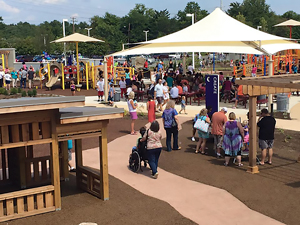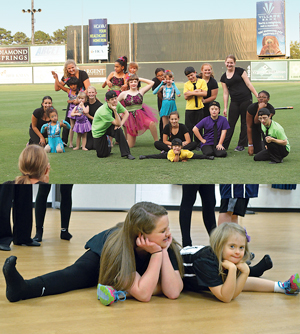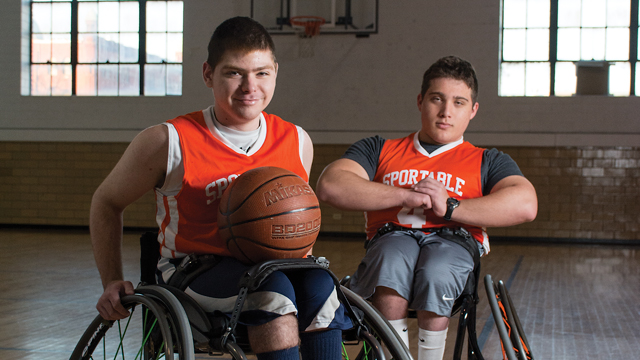A disability can be something as invisible as dyslexia or as apparent as a spinal cord injury. Disabilities of all kinds can act as a barrier to your child’s physical and emotional development. But what about social skills? No matter the challenge, there are ways to keep children engaged and help them build a better social life.
Elijah Bondeson, seventeen, was born with spina bifida, a neural tube defect that is present at birth. At first, he was able to walk with the help of a walker, but by age eight, Elijah required a wheelchair. He and his family lived in Maine, where his mother says there were few services or opportunities for him. One of Elijah’s dreams was to play sports, but there was no way for him to participate. As a homeschooled child, he had limited opportunities to meet kids his age. His parents chose to move to Richmond when they learned that Sportable, an organization that provides sports opportunities for children and adults with handicapping physical conditions, was located here. His mom, Wendy, says, “It’s been great here. He is participating in lacrosse, tennis, and basketball. And he has a new group of friends and mentors.”
Elijah says Sportable has given him a chance to play the sports he loves and is moving the teen closer to his goal of attending college on a basketball scholarship. But beyond sports, Elijah says he has made friends. “We do things together outside of Sportable, like hanging out and talking.” And unlike school teams, even when Elijah gets older, he will still have a place to play.
He likes it so much that he is an athlete ambassador who goes to schools and tells other kids about Sportable. “Sometimes I get a chance to tell a bit about myself and what I like to do. I also get to show my skills to the students and help run the basketball station where able-bodied kids get in a wheelchair and try basketball.”
One of the friends Elijah made through Sportable is 16-year-old Christian Largo. Christian, like Elijah, was born with spina bifida and was thrilled to join Sportable at age six, because, as his mother Shelley says, “his older brother played sports and Christian was dying to play, too. Sportable came along at just the right time for him.”
The organization offers a wide variety of sports activities and Christian has added power wheelchair soccer and is also competitive in power weight lifting. They travel on weekends to basketball tournaments in Fairfax and Maryland and other places. Christian has met new people and made new contacts each time he plays. He plans to compete in the national Paralympics one day and secure a slot on the United States Paralympics Team, a division of the U.S. Olympics.
Hunter Leeman, director of Sportable, says most families agree that engaging in sports makes kids more confident and social. “But most of the kids who come here have never had the opportunity to engage in them before. Sports are the ultimate relationship builder… kids working together on a team, toward the same goals, making the same sacrifices, sharing the same victories,” says Leeman. “I see these strong connections developing every day.”

Finding the right activity or setting can often be all that is needed for new friendships to bloom. In August 2015, Greater Richmond ARC opened ARCpark, a two-and-a-half acre park in Northside Richmond. The purpose was to provide a park-like setting for kids (with and without handicaps) to interact, learn, and grow socially. The park provides three state-of-the-art playgrounds for toddlers, school-aged kids, and adults; an abundance of swings, including a wheelchair-accessible glider and a hammock-like swing; a wheelchair-accessible tree house with an extra-wide ramp; a custom-built, multi-sensory wall with panels that simulate touch, hearing, and sight; a play house; a small stage; water troughs; and music instruments for even more creative play.
Kim Watson is development director for ARC. She says the park has enhanced the development of new relationships for many children. And perhaps most importantly, children with and without disabilities can see each other and interact. “I have seen non-disabled children helping other children with disabilities on the slides and swings here.” While the park is relatively new, Kim says, “on sunny days we have a full parking lot… people love it.”
ARCpark, and other fully accessible outdoor play spaces designed for kids of all abilities to socialize and play freely and safely, are listed at NPR’s community-edited guide to playgrounds for families: playgroundsforeveryone.com.
Another way your child can meet other children is for the family to establish a regular venue for socialization. “If you come at the same time every week to the same place, you see the same faces and get to know each other. Then, parents can make connections for future play dates,” says Liz Pearce, director of mission for the Children’s Museum of Richmond and Commonwealth Parenting, a Richmond organization that provides parents with education and support services. “At the Children’s Museum, we see this happen all the time.”
The Children’s Museum, as well as entertainment outlets for families like Sky Zone, have regularly scheduled times for children with special needs to visit. The Byrd Theatre in Carytown shows a sensory-friendly movie once a month for children and adults with autism and other special needs. Virginia Rep recently launched a program to offer sensory-friendly performances for children with autism and other sensory, social, or learning disabilities. In addition, athletic leagues like River City Buddy Ball, Upward Sports (through local churches), and TOPSoccer, a Richmond Kickers program, offer opportunities for kids to engage with others who have special needs and with kids who don’t.
An activity that is as fun as sports, and also involves teamwork and opportunities for socializing, is dance. Kim Moncrief has degrees in dance and psychology. She traveled and danced competitively with a company and taught many students locally. When she found out that her son, Logan, had Down syndrome, one of her pupils suggested she start a dance class for children with special needs. The initial venture was so successful, Kim launched Miracles in Motion, a dance troupe for kids with special needs. Today, she has so many volunteers, she can give almost one-on-one assistance to each participant.

Through Miracles in Motion, Kim provides ballet, tap, and exercise classes, and of course, stage performances for the community to enjoy. “People are surprised at how good the kids are and that they are all moving in the right direction, jumping, and turning,” said Moncrief. “It’s great to help educate the community and show that if you just give these kids a chance and a little time, they can do it.” Kim adds that the kids love the interaction of the dance performances, and working together to get it right. She says they build friendships naturally, and these relationships spill over into their personal lives.
While having a great place to meet people is key, if a child is lacking a basic understanding of social interaction and has few social skills, it can be much harder, if not impossible for them to make friends. Some issues, like those present for children with disorders on the autism spectrum, present a very different set of challenges. The good news is, social skills can be learned.
In Richmond, there are a number of programs that have been created to provide social training and experiences for children with developmental problems including autism and other disorders that affect social understanding and interaction.
Allison Anderson, whose son Asher participates in Friendations, raves about her son’s experience there. Asher is five years old and has two diagnoses: sensory integration disorder and mood disorder. Together these issues make it difficult for him to understand social cues and build friendships. At the age of three, Asher was struggling with preschool. The frustrations of social interactions led to increased problems with the mood disorder.
“Asher does not read social cues. He wasn’t aware of invading other children’s space,” says Allison, who added that her son is sensory seeking and would get too close to people. He received behavioral modification in his home, then had a mentor from Friendations shadow him in school. “Friendations made all the difference. There is no way Asher would be in kindergarten today without them. We attend group activities at Friendations where they work on social topics like friend making and keeping.”
These are just some of the many places, ventures, and opportunities in Richmond where kids living with physical, mental, and emotional challenges can play, learn, and build friendships that can last for years. So whatever your child’s needs, if you look around, ask others, and think creatively, you will find many ways to help your child widen his world and foster the relationships he or she needs.
Pearce, a Richmond expert in parenting education for twenty-two years, offers this insight for families: “It’s important to step out of your comfort zone. Yes, people may look at your child and may ask questions, but the more you are open to new experiences, the more your child will learn about his world and have new opportunities to build relationships.”
Eight Strategies to Help Your Child Build a Social Life:
1) What are the barriers to his social life? Physical, personality, proximity, available resources. Ask yourself, how can these barriers be reduced or removed?
2) It’s not a bad idea to be a matchmaker. Look for kids who have similar challenges and those who don’t.
3) Everyone is good at something and everyone likes a winner. Where are your child’s skills or talents? Is she good at physical activities, building things, video games, board games? Does he love animals, horses, chess, word games, music? Foster excellence in that arena. Let him be a star.
4) Whatever groups they join or start, encourage them to stick it out! It’s easy to give up when there are barriers, but pure persistence can overcome many obstacles.
5) If your child has a compassionate teacher, ask for help. Ask the teacher to help you identify his strengths, ask her to give him opportunities to shine, and ask if there are other kids in his class who need a friend. See if she can pair the kids up in some activity in the school.
6) Encourage your child to find someone who needs her. While most kids gravitate to the popular, outgoing kids, there are always kids who are having just as difficult a time socially as yours and are in need of a friend.
7) Who is in your neighborhood? Who’s at the bus stop? Location is a key element in relationship development. Find kids that live near you and invite them over to play.
8) Part-time jobs or volunteering lead to work experience, new skills, and new friends.




